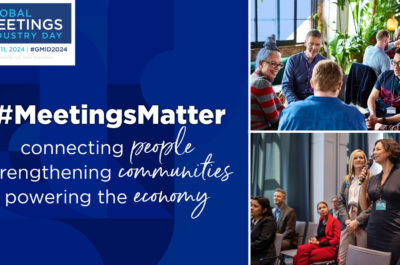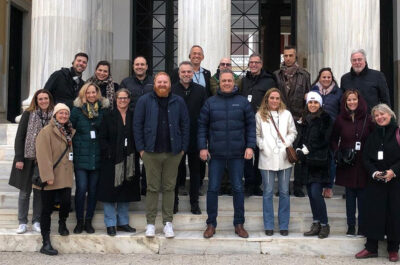Today, winners of major events bids (World Expo, UEFA EURO, Olympics…) should begin planning far ahead, often a decade or longer in advance, recognizing that success in hosting such events must include the supporting infrastructure required.
Cities are increasingly using events to improve their image, stimulate urban development, attract visitors and investment. During last European Cities Marketing (ECM) Annual Meeting in Turin on June 3-6, 2015, European cities confronted their experiences through best practices exchange, with the constant objective to improve operational efficiency and make better business decisions.
Today, winners of major events bids (World Expo, UEFA EURO, Olympics…) should begin planning far ahead, often a decade or longer in advance, recognizing that success in hosting such events must include the supporting infrastructure required. It is important for cities to demonstrate the lasting benefit of that investment: a true legacy for the local community, with the infrastructure and the iconic image the city can build on.
Events shape the cities and make them internationally attractive
Keynote speaker, Valentino Castellani, president of Torino Strategica and former mayor of Turin, gave an iconic and local example of the positioning of Turin as city on the international scene with the Olympics. The Piedmont capital faced the challenge of post-industrial transformation and the Olympic Games forced the city to convert from a manufacturing town to a European regional capital. All this took place against a backdrop of major infrastructure projects (especially crossrail system, Metro, new high-speed railway lines…). 2006 Games were the definite turning point from the depression of the early 90’s to a new pride in affiliation.
 After the 2008 banking crisis that put Iceland on the list of terrorist states and the Eyjafjallajokull volcano that erupted in 2010 paralysing all European air traffic, Reykjavik decided to improve its image in 2010 by organising many winter festivals: as a result, 99% of winter guests say that they will recommend Reykjavik to friends.
After the 2008 banking crisis that put Iceland on the list of terrorist states and the Eyjafjallajokull volcano that erupted in 2010 paralysing all European air traffic, Reykjavik decided to improve its image in 2010 by organising many winter festivals: as a result, 99% of winter guests say that they will recommend Reykjavik to friends.
In the case of Istanbul, the infrastructure changes for the expansion of convention centres (7 convention centres and 3 exhibition halls) transformed the city into a meeting hub, strengthening the international image of the city.
Events and infrastructure are economic development tools and a mean of enhancing the image. They make cities more attractive.
Events generate economical and social benefits
The impacts of these events are multiple: they are means of revitalising cities’ economies, creating infrastructure and improving cities’ image.
With all the infrastructure changes related to the organisation of the 2006 Olympic Games in Turin, while bedspaces rose by 42% between 1999 and 2014, the number of bednights increased by 102% and the number of arrivals by 122%.
In Reykjavik, the winter events result has been that the number of arrivals and bednights doubled in less than 4 years.
The meeting hub statute of Istanbul has consequently increased the number of arrivals and bednights. Indeed, over 130 international conferences and many major events (G20, B20…) are hosted each year and congress tourism contribution to Istanbul’s economy is estimated about 294 million euros in 2014.
When asked in a recent survey conducted by the Culture & Events ECM Knowledge Group, ECM Members stated that the main reasons of attracting events to their city was first to increase the image of the city and secondly to drive more bednights.
All these events and infrastructure implementation have indeed resulted in an increase in arrivals and bednights, during the event, but also in the following years as well. These events attract business and tourist visitors, new residents, investments and jobs which undeniably stimulate the local economy.
Speaking about the meeting theme, Ignasi de Delas, European Cities Meeting President, said: “Events and infrastructures are an important part of cities’ strategies to attract visitors. Once again, this meeting allowed ECM members to share knowledge and expertise and find new synergies. The panel discussion provoked fruitful debates and each attendee went back home with new ideas and new perspectives to implement locally.”
The conference was moderated by Marco Esser, Managing Director at Den Haag Marketing. Throughout the day, a series of case studies of European Cities covered: Festivals with James McVeigh from Festivals Edinburg and Karen Maria Jonsdottir from Visit Reykjavik, Convention centres rehabilitation with Ozgul Ozkan Yavuz from Istanbul Convention & Visitors Bureau, UEFA EURO with Marta Stawinska from Poznan Tourism Organisation and World Expo with Andre Moura from Turismo de Lisboa.
ECM has also signed a partnership contract with Toposophy, aiming to become the leading destination management and marketing agency in Europe.
Toposophy is a destination marketing agency including a dedicated team of destination experts and tourism professionals along with fully committed partners at all levels. Toposophy is committed to supporting tourism organizations, associations and companies (both public and private) in transforming places into thriving destinations. The portfolio of Toposophy consists of complete solutions for destination strategy & planning, place marketing & branding (online and offline), market intelligence, trade marketing, advocacy & government support, tailor-made to every place’s distinct needs.
Under the deal, Toposophy will provide ECM member cities with research topics related to the most up-to-date trends and the future itself of destination development and marketing.
The first edition will tackle the future of city marketing, leading change in making attractive places: why do cities increasingly devote resources to place marketing and branding strategies and how does the expertise of DMOs can help them undertake a leading role in the same fields? In what ways will the future DMOs make sure that urban planners pay equal attention to tourism activities compared to all other residential, professional and leisure activities?
In welcoming the new partnership, Ignasi de Delas, declared: “In the past few years, the City Marketing issue has intensified and ECM is responding to this challenge through the creation of a new Knowledge Group and the extension of its market intelligence. Thanks to Toposophy, we will be able to have a critical overview of latest international trends in city marketing and turn that information into a competitive advantage, a key to our forward looking strategy.”
Commenting on the partnership agreement, Toposophy CEO Manolis Psarros added: “We are delighted to partner with ECM, share information with Tourist Offices and Convention Bureaux and exchange views & insightsabout key trends of European destinations.”
The next ECM meeting will take place in Madrid, February 24-27, 2016 and will discuss whether or not city branding is still relevant in a digital era.
Photo caption: Ignasi de Delas, European Cities Meeting President and Manolis Psarros, Toposophy CEO.
Vicky is the co-founder of TravelDailyNews Media Network where she is the Editor-in Chief. She is also responsible for the daily operation and the financial policy. She holds a Bachelor's degree in Tourism Business Administration from the Technical University of Athens and a Master in Business Administration (MBA) from the University of Wales.
She has many years of both academic and industrial experience within the travel industry. She has written/edited numerous articles in various tourism magazines.






























































































































































































